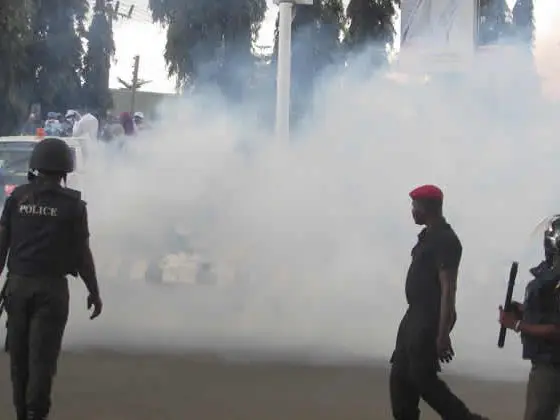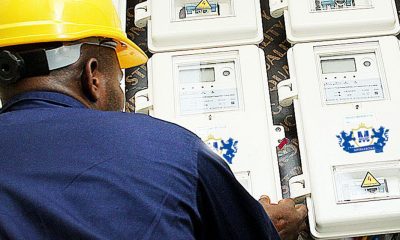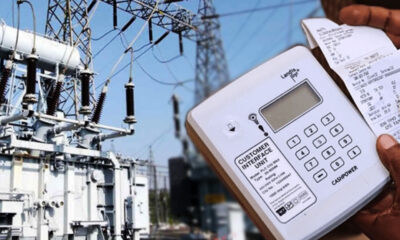News
Discos install 504,729 meters, unmetered customers now 7.1million

Discos install 504,729 meters, unmetered customers now 7.1million
The number of power consumers without meters across the country is now 7,117,167, as a total of 504,729 meters were installed by electricity distribution companies between January and September 2023.
Data obtained from the latest third quarter report of the Nigerian Electricity Regulatory Commission indicated that as of September 30, 2023, there were 12,825,005 registered electricity customers in Nigeria’s power sector.
The NERC stated that out of this number, only 5,707,838 customers had been metered, which implies that over 7.1 million registered power users across the country lack meters.
A further analysis of the first, second and third quarter reports of the power sector regulator indicated that electricity distribution companies installed a total of 504,729 meters during the nine-month period.
They installed 175,281 meters in the first quarter, deployed 181,059 meters in the second quarter, while this dropped to 148,389 meters in the third quarter. Meter installations are ongoing in this current fourth quarter.
Providing an explanation on metering in its latest third quarter 2023 report, the commission said, “As at September 30, 2023, there were 12,825,005 registered electricity customers in the NESI (Nigeria Electricity Supply Industry) out of which only 5,707,838 (44.51 per cent) are metered.
READ ALSO:
- PDP unhappy with Fubara over plan to implement peace pact initiated by Tinubu
- Probe into $500m Union Bank acquisition widens as Special Investigator invites ex-CBN dep gov, others
- 145 killed as bandits attack 23 villages in Plateau
“Over the course of 2023/Q3, 148,389 end-user customers were metered. Ikeja, Abuja and Ibadan Discos had the highest number of meter installations in 2023/Q3, accounting for 27.35 per cent, 20.78 per cent and 17.53 per cent respectively of the total installations.”
It stated that the 148,389 meters installed in 2023/Q3 represented a decrease of 32,670 installations (-18.04 per cent), when compared to the 181,059 meters installed in 2023/Q2.
“The new installations resulted in a 0.35pp increase in net end-user metering rate in the NESI between 2023/Q2 (44.16 per cent) and 2023/Q3 (44.51 per cent),” the commission stated.
It noted that during the quarter, 147,736 meters were installed under the Meter Asset Provider framework, while 207 meters were installed under the National Mass Metering Programme framework.
The Vendor Financed framework recorded 446 meter installations while no meter installations were recorded under the Disco Financed framework,” the power sector regulator stated.
Operators in the sector have repeatedly blamed the liquidity crisis in the sector for the low deployment of meters and other challenges in the industry.
READ ALSO:
- Tinubu ill-advised on Niger Republic sanctions – Ndume
- Auto crash claims 9 on Christmas Day in Osun
- Army to take delivery of helicopters, others in 2024 – COAS
The Minister of Power, Adebayo Adelabu, had during the recent power sector ministerial retreat in Abuja, admitted that financing was a major challenge in the business of electricity supply in Nigeria.
He disclosed this while speaking on finance, revenue assurance and capital investment programmes across the electricity value chain in Nigeria.
“The heart of NESI’s proposed reforms hinges upon securing long-term financing across the entire value chain.
“While past discussions highlighted concerns about the financial capacities of private sector players from the 2013 privatisation, our focus must centre on collaborative solutions to alleviate present liquidity challenges.
“Initiating this quest for robust investment involves attracting domestic institutional investors and reputable partners from well-governed sectors within the electricity value chain.
“At this retreat, we’ve invited established infrastructure financiers and fintech innovators to infuse fresh thinking into our industry, aiming to develop innovative policies enabling capital investment programmes and fiscal incentives that elevate the risk profile of sector opportunities to financeable levels,” the minister stated.
Discos install 504,729 meters, unmetered customers now 7.1million
News
Teargas, Chaos at EFCC as El-Rufai’s Supporters Clash with Security Operatives

Teargas, Chaos at EFCC as El-Rufai’s Supporters Clash with Security Operatives
Tension gripped Abuja on Monday as security operatives fired teargas to disperse protesters and supporters of former Kaduna State Governor, Nasir El-Rufai, during a confrontation at the headquarters of the Economic and Financial Crimes Commission (EFCC).
The standoff reportedly occurred when hundreds of El-Rufai’s supporters accompanied him to the anti-graft agency’s headquarters, escalating an already charged political atmosphere in the Federal Capital Territory.
Eyewitness accounts and video footage circulating online showed security personnel deploying teargas canisters as crowds surged toward the EFCC complex.
In one of the videos, agitated voices were heard declaring, “We will come back; when it clears, we will come back,” suggesting the group’s resolve to sustain their protest despite the crackdown.
READ ALSO:
- NSCIA Secretary-General Clarifies Council Receives No Government Funding
- Saudi Supreme Court Calls on Muslims to Sight Ramadan Crescent Moon on Tuesday Evening
- Nigeria Tax Act 2025: FG Clarifies No New Construction or Bank Taxes
The development follows reports last Thursday that El-Rufai was allegedly stopped by security operatives at the Nnamdi Azikiwe International Airport, Abuja, in what his supporters described as an attempted arrest.
While official details surrounding the airport incident remain unclear, the situation appeared to have heightened tensions among his loyalists.
El-Rufai, who served as governor of Kaduna State from 2015 to 2023, remains a prominent political figure and a key voice within Nigeria’s political landscape.
His tenure was marked by sweeping reforms as well as controversy over security challenges and policy decisions in the state.
As of press time, the EFCC had yet to issue an official statement clarifying the circumstances surrounding Monday’s confrontation or addressing reports of any investigation involving the former governor.
Security presence around the commission’s headquarters was significantly reinforced following the clash, with access to parts of the area temporarily restricted.
The incident adds to growing political tensions in the country, particularly as anti-corruption investigations continue to intersect with high-profile political actors.
Teargas, Chaos at EFCC as El-Rufai’s Supporters Clash with Security Operatives
News
NSCIA Secretary-General Clarifies Council Receives No Government Funding

NSCIA Secretary-General Clarifies Council Receives No Government Funding
The Secretary-General of the Nigerian Supreme Council for Islamic Affairs (NSCIA), Prof. Is-haq Oloyede, has clarified that the council has never received financial support from any government, either within or outside Nigeria. Speaking in Lagos at the 31st Annual Pre-Ramadan Lecture of the University of Lagos Muslim Alumni (UMA), Oloyede stressed that the NSCIA operates independently and relies largely on modest private donations to sustain its activities.
Oloyede, who also serves as Registrar of the Joint Admissions and Matriculation Board (JAMB), explained that in his 15-year tenure as NSCIA Secretary-General, the council had not received “a kobo” from any government. He added that fewer than 20 individuals have donated amounts up to ₦500,000 since 2013, highlighting that the council functions without significant external funding. He decried misinformation and divisive narratives suggesting government involvement under the leadership of the Sultan of Sokoto, Muhammad Saad Abubakar, noting that such speculation undermines unity within Nigeria’s Muslim community.
READ ALSO:
- Saudi Supreme Court Calls on Muslims to Sight Ramadan Crescent Moon on Tuesday Evening
- Nigeria Tax Act 2025: FG Clarifies No New Construction or Bank Taxes
- Israeli Airstrikes Kill 12 in Gaza as Violence Persists Despite Ceasefire
Speaking on the theme “Muslims: The Challenge of National Security,” Oloyede warned against viewing insecurity, terrorism, and banditry through a religious lens. He said extremists often cloak their violent acts in religious language, but such actions do not reflect Islam. “Islam cannot be determined by what extremists say or do. We have a duty to correct that narrative,” he said, urging Muslims to reject all forms of extremism while understanding that insurgency thrives on enabling political, social, and economic conditions.
Oloyede stressed that security is central to Sharia, emphasizing that a true Muslim is someone “from whose actions neighbours — regardless of their faith — are safe and secure.” He cautioned against reducing insecurity to regional or religious differences, noting that all parts of Nigeria face security challenges. He called on Muslims to embrace moral responsibility, civic accountability, and practical partnerships to improve national security.
Other speakers at the lecture also highlighted the societal dimensions of insecurity. Dr. Ridwan Jamiu, Chief Imam of Lekki Central Mosque, described insurgents as agents of evil and stressed the need for religious leaders to promote peace and guide followers toward positive community engagement. Lagos State Assembly Speaker Mudashiru Obasa identified poverty and economic inequality as key drivers of insecurity and urged the government and policymakers to focus on job creation, education, and inclusive development as long-term solutions.
The lecture, part of the annual pre-Ramadan engagements, comes at a time when Nigeria continues to grapple with complex security challenges, including insurgency in the Northeast, banditry in the Northwest and North-Central, and rising violent crime in the South. Experts emphasize that national cohesion, interfaith cooperation, and community-led security initiatives are vital to tackling these threats effectively.
NSCIA Secretary-General Clarifies Council Receives No Government Funding
News
Saudi Supreme Court Calls on Muslims to Sight Ramadan Crescent Moon on Tuesday Evening

Saudi Supreme Court Calls on Muslims to Sight Ramadan Crescent Moon on Tuesday Evening
The Supreme Court of Saudi Arabia has urged Muslims across the Kingdom to look for the Ramadan crescent moon on the evening of Tuesday, February 17, 2026, to determine the official start of Ramadan 1447 AH. The court emphasized that community participation in moon sighting is vital for confirming the beginning of the holy month.
In an official statement relayed by the Saudi Press Agency, the Supreme Court instructed anyone who spots the new moon crescent — either with the naked eye or using binoculars — to report their observation to the nearest court and ensure their testimony is recorded. Local centres have also been set up to assist observers in reaching judicial offices.
The Kingdom has established moon sighting committees across regions to coordinate observations and support public involvement. Authorities encouraged citizens to actively participate, noting that their contributions are essential to help Muslims across Saudi Arabia begin Ramadan in unity.
READ ALSO:
- Nigeria Tax Act 2025: FG Clarifies No New Construction or Bank Taxes
- Israeli Airstrikes Kill 12 in Gaza as Violence Persists Despite Ceasefire
- FBI Probe Continues as Ex‑Church Minister Who Confessed to Child Abuse Remains Free
Tuesday corresponds to 29 Sha’ban 1447 AH in the Islamic lunar calendar. If the crescent moon is sighted, Ramadan 1447 AH will commence on Wednesday, February 18, 2026. If the moon is not visible, Sha’ban will be completed as 30 days, and Ramadan will begin on Thursday, February 19, 2026. This aligns with centuries-old Islamic tradition of lunar observation.
Muslims worldwide, including in the Gulf Cooperation Council (GCC) countries, are preparing for Ramadan, a sacred month of fasting, prayer, reflection, and charity. Astronomical forecasts suggest visibility may vary across regions, making local observations and testimonies crucial. Similar calls for crescent moon sightings have also been issued by authorities in countries such as Qatar and the United Arab Emirates.
The Supreme Court’s announcement underscores the importance of lunar observation in Islamic practice and encourages public engagement to ensure a synchronized start of Ramadan across the Kingdom.
Saudi Supreme Court Calls on Muslims to Sight Ramadan Crescent Moon on Tuesday Evening
-

 Education2 days ago
Education2 days agoCheck Your Name: UNILORIN Releases Updated NELFUND Refund List for 2024/2025 Students
-

 News1 day ago
News1 day agoOsogbo Sons and Daughters Mark 5th Anniversary with Awards, Political Undertones
-

 metro2 days ago
metro2 days agoWoman Arrested Over Murder of Nigerian E-Hailing Driver in South Africa
-

 News2 days ago
News2 days agoAfenifere Calls for Immediate Take-Off of State Police as Terror Threats Rise in Yorubaland
-

 metro2 days ago
metro2 days agoBoko Haram Terrorists Release Video of 176 Abducted Kwara Residents
-

 metro14 hours ago
metro14 hours agoUS Freezes Assets of Eight Nigerians Over Boko Haram, ISIL, Cybercrime Links
-

 metro2 days ago
metro2 days agoUS Military Boosts Support for Nigeria’s Fight Against Insurgency With Ammunition, Troop
-

 metro15 hours ago
metro15 hours agoTerror in Lagos Traffic: Cutlass Gang Unleashes Mayhem on Mile 12–Ketu Road















